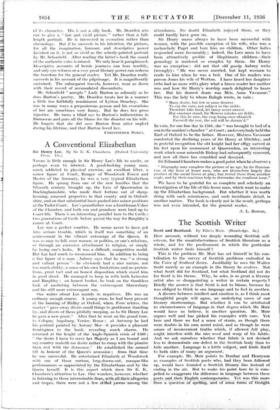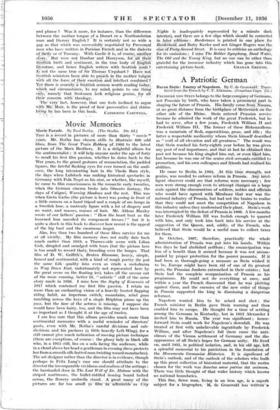The Scottish Writer'
Scott and Scotland. By Edu in Muir. (Routledge. 5s.)
How account, without too deeply wounding Scottish self- esteem, for the unsatisfactoriness of Scottish literature as a whole, and for the predicament in which the particular Scottish writer finds himself ?
This is the problem Mr. Muir has set himself in his con- tribution to the survey of Scottish problems embodied in the Voice of Scotland Series. Justifiably he uses Sir Walter Scott merely as an example in the 'theory he evolves. Not what Scott did for Scotland, but what Scotland did not do for Scott is his theme. Why, he asks, is so great a literary artist also so disappointing a writer in certain respects ? Briefly the answer is that Scott is not to blame, because he was obliged to think in one language and to feel in another.
A divorce between intellect and emotion is, as I think most thoughtful people will agree, an underlying cause of our literary shortcomings. But whether it can be attributed to circumstances of language in that degree which Mr. Muir would have us believe, is another question. Mr. Mitir argues well and has picked his examples with care. Yet here and there we feel a sense of strain, as though there were doubts in his own secret mind, and as though he were aware of inconvenient truths which, if allowed lull play, might interfere with the nice woof and warp of his fabric. And we ask ourselves whether that fabric is not devised less to demonstrate one defect in the Scottish- body than to hide another. Language is a kittle subject, and lends itself •
to both sides of many an argument. .
For example, Mr. Muir points to Dunbar and Henryson as examples of Scottish. poets who, had they been followed up, would have founded a- Scottish literary line instead of ending in the air. But to make his point- here- he is com- pelled to exaggerate the difference in language between these poets and their English contemporaries. Yet was this more than a question of spelling, and of some turns of thotig t and phrase ? Was it more, for instance, than the difference between the mother tongue of a Dorset or a Northumbrian man and literary English ? It is certainly not so wide a gap as that which was successfully negotiated by Provençal men who have written in Parisian French and in the dialects of Sicily or of Tuscany. With Gaelic it is, of course, ail-other story` But were not Dunbar and Henryson, for all their &Offish birth and sentiment, in the true body of English'
. .
literature, and hence English writers with Scottish souls ? Is not the same true of Sir Thomas Urquhart ? Have.. not Scottish ministers been able to preach in the mother tongue With all the force of their emotion and intellect Combined*? '5*(4 there is scarcely, a Scottish sermon worth reading today,' which sad circumstance, to my mind, points to one think' -namely that Scotsmen lack religious genius, for all tfieir concern with' theology. r The' very' fact, however, that one feels inclined to argue with-Mr:Muir, is the proof of htisi provocative ind kiting, he has been in this hook CATHERINE -.

















































 Previous page
Previous page